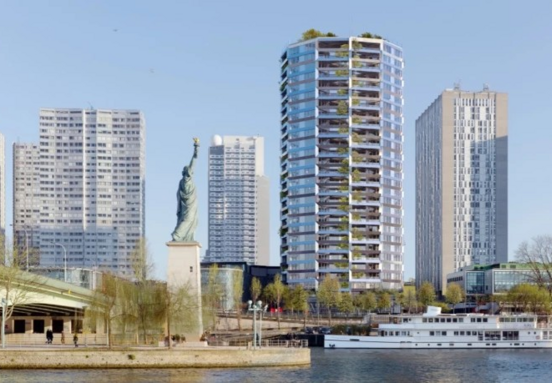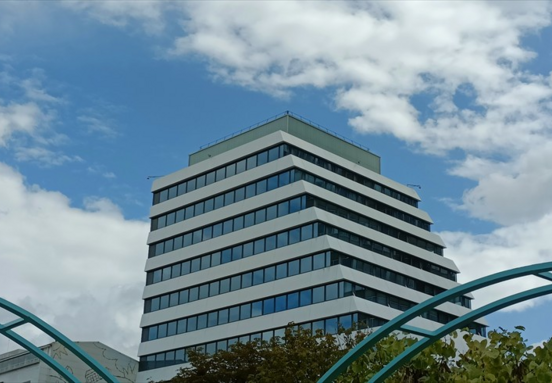Choosing an office location shouldn’t be rushed. You need to consider many factors related to the space itself and its impact on both your staff and your clients. Review the following points to guide your search, no matter what stage you're at.
Office lease or co-working space?
The first decision to make is about the type of space you want to move into. Office leases are more expensive and lock you in for a longer period, but they give you more freedom in how you use the space.
Customizing the space with your own branding makes a big difference for your team’s morale and the impression you give to clients, especially in more traditional industries like finance.
Co-working spaces may suit you better if you have a smaller team with growth potential, or if you only need space for a limited time. Plus, being in a co-working space removes certain responsibilities, like restocking coffee or toilet paper. These spaces often host free classes, clubs, and talks (and hand out free cookies!) to promote employee well-being.
Hidden costs
When setting your relocation budget, don’t forget to include stamp duty, fit-out costs, legal fees, and buyer’s agent commissions. While rent will make up the bulk of your office expenses, these additional costs are not negligible. It’s also worth checking out property tax rates for the buildings you're interested in.
Remember to factor in ongoing operating and cleaning costs once you're in the office, as well as any fees associated with disposing of unused items or equipment that didn’t make the move.
Read the lease carefully before signing to understand which costs are your responsibility and which are covered by the landlord.
Alignment with brand image
As mentioned earlier, your office location is an extension of your brand.
If you’re a tech start-up, a run-down or shabby office won’t inspire confidence. On the other hand, if you're a non-profit organization with a more frugal identity, spending heavily on office space could send the wrong message.
Legal considerations
Make sure to check any legal implications of moving offices, as regulations may have changed since your last move.
Your new office must comply with safety standards regarding health risks, fire protection (your local fire department can help with this), and lockdown procedures. When relocating office equipment and data, ensure you’re handling data in accordance with GDPR.
If employees are reluctant to move, you may need to offer redundancy depending on the mobility clause in their contracts. This isn’t strictly a legal matter, but be sure to check local crime rates via the police website. It’ll give you a good idea of how safe an area is for your staff and visitors, as well as the risk of office break-ins.
Room to grow (if needed)
Fast-growing companies will need space to expand. Think about how many people you plan to hire and find a space that can accommodate that, it might even motivate you to reach your growth targets!
Similarly, if you want your team to work on-site, you’ll need to be near your talent pool. Ask local recruitment agencies what kind of talent is available in the area you’re considering.
Local competition
Consider what kind of competition exists in the area you're targeting.
More competition often drives better performance. With that in mind, you might want to set up in a location known for your industry, like near the Silicon Roundabout in Shoreditch if you're a fintech company. This opens opportunities to work with other businesses for clients, supplies, and strategic partnerships you might not have anticipated.
But be aware, competition can hurt performance in some sectors. For example, if you're a marketing agency in an area already saturated with similar firms, you may struggle unless you have a strong niche, such as female-led branding or a focus on food and beverage clients.
Convenience for staff
Of course, your office should be accessible by bus, train, subway, or tram. For employees who prefer cycling, the new location should also be bike-friendly. Make sure there’s bike storage or a nearby docking station, and that the building offers good amenities such as showers and drying cabinets.
If on-site parking isn’t available, let your team know where the nearest parking options are.
It’s widely acknowledged that well-being is essential for employees. When considering office locations, think about nearby cafes, bars, gyms, banks, and shops that can meet their everyday needs.
Ease of access for visitors
Your priority is making the office accessible to staff, but what about visitors? Remote office locations can be hard to reach by public transport or difficult to find on Google Maps. If they’re hard to locate, business meetings can get off to a rocky start. Weigh the cost of a cheaper but less accessible office against a more expensive space in a better-connected area with more business opportunities.
Choosing the right office space can make the difference between attracting and deterring clients.
Proximity to suppliers
If your business relies on physical products, especially hard-to-source ones, you’ll want to stay close to your suppliers. Moving farther away while sticking with the same supplier could significantly increase delivery costs. In that case, it’s worth looking for a supplier closer to your new location.







